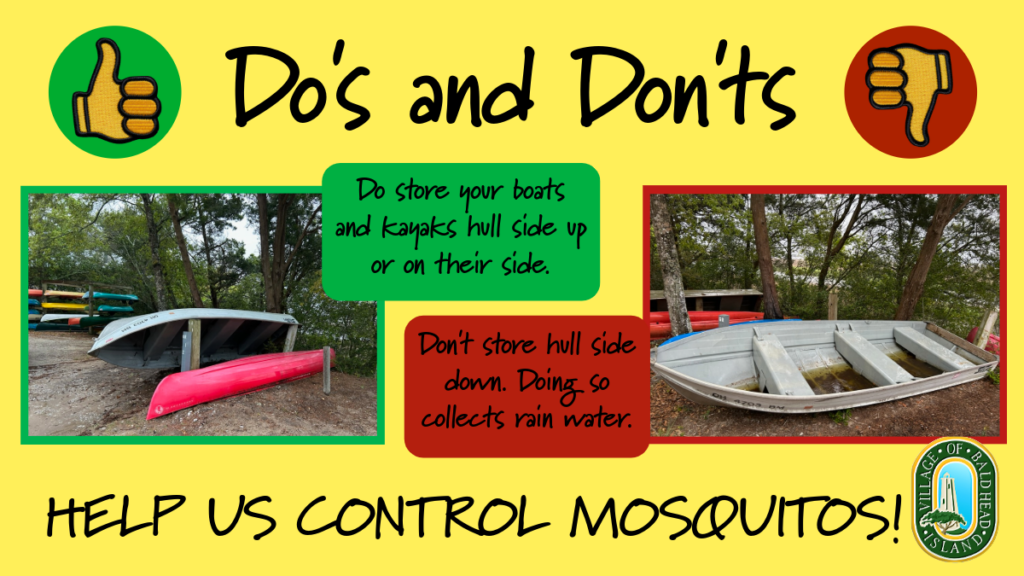Mosquito Control
The Village of Bald Head Island has had a mosquito control program for over 20 years. It has varied in intensity over the years and is metered proportional to natural demand. In years that are more “wet” with high rainfall totals, rainwater accumulates in low areas of the island. These areas are prime breeding grounds for mosquitos. The Public Works Department maps out these areas and adds more locations to the map as they are discovered.
The low areas are treated both pre-emptively and reactively with larvicides in the form of residual bricks that prevent mosquito larvae from developing into adult mosquitoes. The residual bricks serve as an insect growth regulator that specifically targets mosquitoes and are harmless to fish, waterfowl, mammals, and beneficial predatory insects.
Another product the Village uses to control mosquitoes is horticultural oil. This product is innocuous to the environment and has a 100% fatality rate for mosquito larvae. The product is dispensed via pump sprayer in liquid form to the surface of standing water causing the air-dependent larvae to suffocate.
In addition to chemical control measures, the Village has used biological control measures. This entails releasing fish into low areas so that they consume the mosquito larvae.
Finally, the Village will utilize the last resort, sending out the spray truck to fog areas that have been determined as high landing count areas. The fog method kills flying adult mosquitos. This method must be performed during appropriate weather conditions. The spraying is restricted where the spray may drift near bodies of water and bee hives.
All control methods are not 100 percent effective. There is no method that can control mosquitoes100 percent.
Who is applying chemicals?
The Public Works Department has several employees who hold the proper licenses to purchase and apply a large variety of restricted-use pesticides. These employees studied the relevant subjects, passed NC state exams, and hold valid NC state pesticide licenses which they maintain in good standing through ongoing education under the direction of department superintendents.
What pesticides is the Village using?
The Public Services uses primarily but is not limited to the following chemicals:
What should Islanders do?
Please help the Village control the mosquito population on the island by taking preventative measures to remove potential breeding areas. This includes emptying pots or other rain-collecting containers, filling in low spots, and making sure that you are inspecting tarps and boats after heavy rain to make sure that any water collected is taken care of as soon as possible. If you have a vessel at the Creek Access, please make sure that it is stored on its side or hull side up to prevent rainwater collection.
If the spray truck is utilized, it will be fogging between the hours of 6:00 a.m. and 10 a.m. As a precautionary measure, people and pets should go indoors when they see the spray truck coming. You may hear the truck before you see it.
If you think your area needs to be treated, please submit a service request online (HERE) or by calling customer service at (910) 457-9700 ext. 1000. Our trained technicians will follow up with a landing count to determine the next steps.
If you are a beekeeper, please register your hive HERE.

Resources & Information
- Center for Disease Control – Mosquitoes
- Environmental Protection Agency – Mosquito Prevention and Control
- National Pesticide Information Center
- American Mosquito Control Association
- Fieldwatch – Supports communication, collaboration, and cooperation between crop growers, beekeepers, and pesticide applicators.
- NC Department of Agriculture and Consumer Services
- NC Cooperative Extension
Questions?
Please contact the Village Public Information Officer at public.information@villagebhi.org or (910) 457-9700 ext. 1025.
